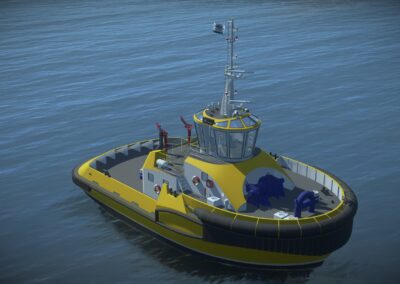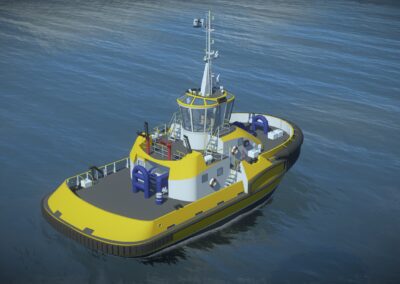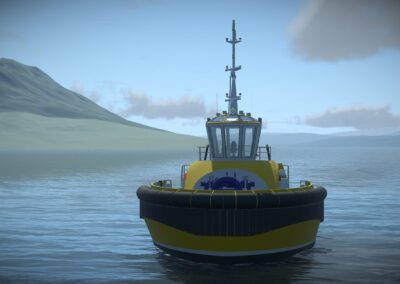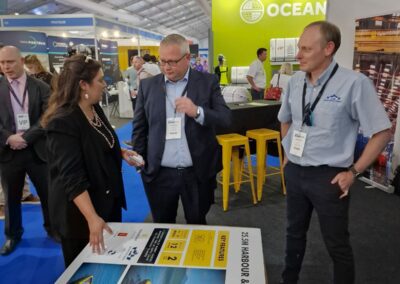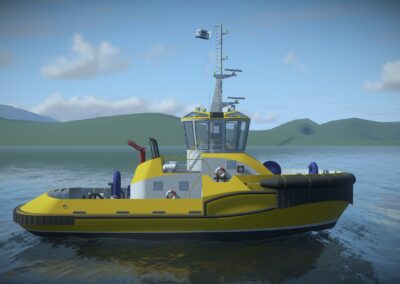Zero Emissions Collaboration With Harland & Wolff
Harland & Wolff has joined forces with Macduff Ship Design, Kongsberg Maritime and Echandia, to create a UK consortium with a common vision to develop and build a zero emissions harbour and coastal tug.
The nature of the UK’s topography and infrastructure means that transporting large fabricated structures, components or raw materials by road is difficult. It adds significant pressure on the road network, as well as increasing the carbon footprint dramatically.
Creating environmentally-friendly tugs and a class of ultra-efficient large barges to service the UK’s Marine Coastal Highway would not only ease pressure on the nation’s roads and reduce emissions, but also help with the Levelling Up and Net Zero ambitions. Having the ability to efficiently move large loads on the Marine Coastal Highway would create greater opportunities for shipbuilding as well as fabrication of structures for offshore wind developments across the entire country, helping spread work beyond the industry’s existing focus on the central belt of Scotland and supporting the UK’s National Shipbuilding Strategy.
Two tugs are planned in the initial order, and each will be 25.5m long, have a breadth of 12m, and a draught of 4.85m along with an impressive bollard pull for its size at 50 tonnes. The vessels are expected to have Azimuth stern drives and a series of modular battery banks. Two barges are initially planned, one measuring 90m by 30m, and the second 50m by 15m.
Together, the consortium plans to utilise technology transfer to develop and build the vessels using a 100% UK supply chain.
Harland & Wolff will act as project lead and builders, Macduff as designers, Kongsberg for propulsion and vessel control systems, and Echandia as battery and electrical control systems specialists. This consortium has been created to bring the very best technologies and skills required to deliver this pioneering green design.
The consortium will utilise innovative design combined with proven battery and propulsion technologies with the aim to deliver a zero-emissions vessel that will utilise electric propulsion from stored battery power for day-to-day operations, backed up by generators driven by biofuel for exceptional operations or when shore charging support is unavailable.
Although initially intended to move loads between Harland & Wolff’s yards, barges which are not full could transport freight for other clients, further easing traffic congestion on the road network. The consortium believes a significant number of similar vessels of smaller and larger designs and capabilities that will be required in the coming decade. Additionally, the technologies deployed are scalable to enter into the Crew Transfer Vessels (CTV) and Service Operation vehicles (SOV) markets in due course.
There is widespread agreement that a strong export market exists for these tugs and the consortium will work closely with the Department for Business and Trade in future to exploit export opportunities, benefiting UK jobs and economic growth.
We are pleased that our company commitment to drive towards net zero solutions for the maritime industry has been recognised by Harland and Wolff. We have been working on various initiatives to move towards net zero and this collaboration signals a major milestone in this. We are delighted to be working with Harland and Wolff, Kongsberg and Echandia on this project and look forward to developing the project through to completion.
As part of our ongoing commitment to fully embrace the UK National Shipbuilding Office’s aims and in our drive to Net Zero, we are pleased to have put together this consortium.
These will be the first vessels of this type to be designed and constructed in the UK and will go on to provide firm foundations for the build of various vessels requiring this type of technology in the future. We are delighted by the initial feedback that we have received from potential clients and look forward to seeing these vessels come to life in our shipyards.
Innovations such as this are crucial to us realising our decarbonisation ambitions for shipbuilding. This is an exciting project closely aligned to the vision for UK shipbuilding we set out in the National Shipbuilding Strategy Refresh. Bringing together companies from across the shipbuilding enterprise, this consortium is demonstrating how collaboration can harness its competitive edge in the growing low emissions market.

